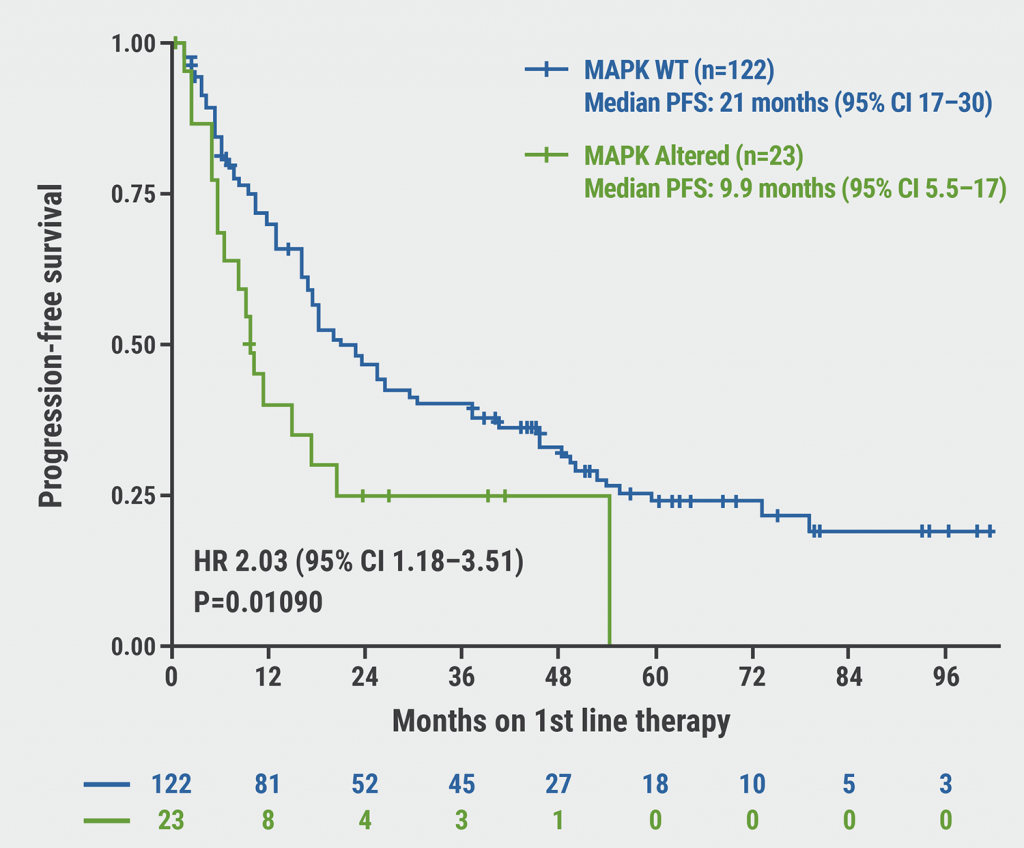Resistance to anti-human epidermal growth factor receptor 2 (HER2)-therapy is common and more insight in the molecular pathways involved, could lead to new treatment strategies. Previous research demonstrated the involvement of alterations in the PI3K-pathway in resistance to anti-HER2 therapy [1,2].
To explore the role of the mitogen-activated protein kinase (MAPK)-pathway in anti-HER2 resistance, Dr Emanuela Ferraro (Memorial Sloan-Kettering Cancer Center, NY, USA) and colleagues performed next generation sequencing on 733 HER2-amplified tumours (385 primary, 348 metastatic) from patients with advanced HER2-positive breast cancer. Frequency of MAPK-pathway alterations was 9.8% in primary tumours and 15.6% in metastatic tumours [3,4]. Of note: frequency of PI3K-pathway alterations were 30.6% and 37.3%, respectively. Both PI3K-pathway alterations (mutant 13 months vs wildtype 23 months; P=0.0013) and MAPK-pathway alterations (mutant 9.9 months versus wildtype 21 months; P=0.01, see Figure) were associated with a statistically significant worse clinical outcome for progression-free survival. MAPK-pathway alterations were also independently associated with worse outcome after correction for PIK3CA mutations, ERBB2 amplification, and oestrogen-receptor status (HR 2.24; P=0.0039). The causal involvement of MAPK-pathway in HER2-resistance was confirmed in additional in vitro studies, where MAPK-altered cell lines showed resistance to FDA approved HER2-inhibitors. In addition, HER2-resistant cell lines proved to be sensitive for MEK inhibitors.
Figure: Progression-free survival stratified by MAPK-pathway alteration [3,4].

MAPK, mitogen-activated protein kinase; WT, wildtype; PFS, progression-free survival; HR, hazard ratio.
Reprinted and modified from Smith AE, et al. Nat Commun. 2021;12(1):6667 Doi.org/10.1038/s41467-021-27093-y under the terms of the Creative Commons Attribution 4.0 license.
“Our analysis uniquely identified MAPK-pathway alterations as additional potential drivers of resistance to anti-HER2 therapy. Inhibition of the PI3K or MAPK-pathway in such tumours may represent a new therapeutic strategy to extend the anti-HER2 benefit,” concluded Dr Ferraro.
- Berns K, et al. Cancer Cell. 2007;12:395–402.
- Baselga J, et al. J Clin Oncol. 2014;32:3753–3761.
- Ferraro E, et al. Genomic analysis of 733 HER2+ breast cancers identifies recurrent pathways alterations associated with anti-HER2 resistance and new therapeutic vulnerabilities. GS3-03, SABCS 2021 Virtual Meeting, 7–10 December.
- Smith AE, et al. Nat Commun. 2021;12(1):6667.
Copyright ©2022 Medicom Medical Publishers
Posted on
Previous Article
« Genomic signatures of DCIS define biology and correlate with clinical outcomes Next Article
Inducers of ferroptosis are potential drugs to target p53-mutated TNBC cells »
« Genomic signatures of DCIS define biology and correlate with clinical outcomes Next Article
Inducers of ferroptosis are potential drugs to target p53-mutated TNBC cells »
Table of Contents: SABCS 2021
Featured articles
Early-Stage Breast Cancer
Aromatase inhibitors outperform tamoxifen in premenopausal women
Concurrent taxane plus anthracycline most beneficial in reducing risk of breast cancer
Reduced risk of recurrence with ovarian suppression plus tamoxifen/exemestane
Metformin does not improve outcomes in patients with early-stage breast cancer
Omitting sentinel lymph node biopsy improves arm symptoms
HR-positive/HER2-negative Breast Cancer
Addition of palbociclib to standard endocrine therapy does not improve outcome in adjuvant treatment
The SERD elacestrant improves outcomes for patients unresponsive to endocrine therapy
Consistent overall survival benefit of ribociclib in advanced breast cancer
Premenopausal women benefit from adjuvant chemotherapy next to endocrine therapy
Promising anti-tumour activity of the CDK7-inhibitor samuraciclib plus fulvestrant
ctDNA is prognostic and predictive for response to ribociclib plus letrozole
Early switch to fulvestrant plus palbociclib beneficial for patients with ESR1 mutation
Triple-Negative Breast Cancer
Single-cell spatial analysis can predict response to neoadjuvant immunotherapy
Neoadjuvant pembrolizumab plus chemotherapy benefits event-free survival in TNBC
Early use of ctDNA testing can identify likelihood of relapse in TNBC
Pembrolizumab plus chemotherapy benefits patients with combined positive score ≥10
Neratinib plus trastuzumab plus fulvestrant shows encouraging clinical activity
Phase 1–3 Trials
Datopotamab deruxtecan shows promising anti-tumour activity
Trastuzumab deruxtecan outperforms trastuzumab emtansine
Nivolumab plus ipilimumab serve promising dual checkpoint inhibition
Entinostat plus exemestane improves progression-free survival in Chinese patients
Efficacy of pyrotinib plus capecitabine confirmed in previously treated patients
Basic and Translational Research
Using genomics to match treatments improves outcomes
Loss of ASXL1 tumour suppressor promotes resistance to CDK4/6 inhibitors
Inducers of ferroptosis are potential drugs to target p53-mutated TNBC cells
MAPK-pathway alterations are associated with resistance to anti-HER2 therapy
Genomic signatures of DCIS define biology and correlate with clinical outcomes
BRCA2 linked to inferior outcomes with CDK4/6 inhibitors plus endocrine therapy
Miscellaneous
Olaparib is well tolerated as an additional treatment
Race effects the likelihood to develop lymphoedema following breast cancer treatment
Sentinel lymph node staging is non-inferior to complete axillary lymph node dissection
One in 7 breast cancers detected during screening are overdiagnosed
© 2024 Medicom Medical Publishers. All rights reserved. Terms and Conditions | Privacy Policy


